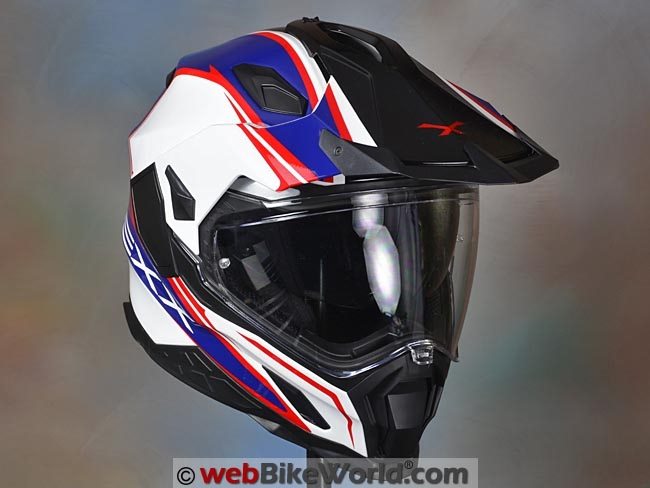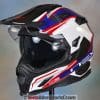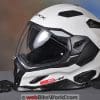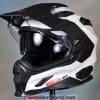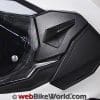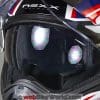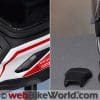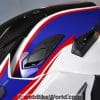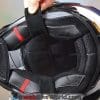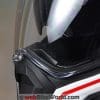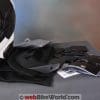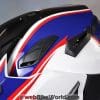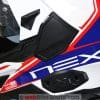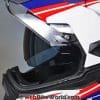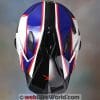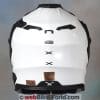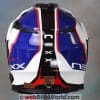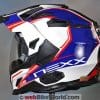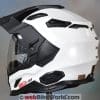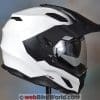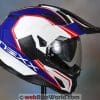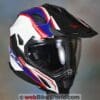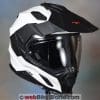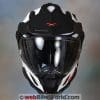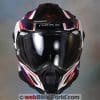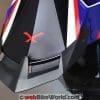The Nexx XD1 is a Dual Sport helmet that we call a true modular, because it can be converted to a full-face or off-road helmet. It is a lightweight, high-quality and full-featured Dual Sport helmet that also looks good as a “Streetfighter” when the peak is removed. Or, leave the adjustable peak attached and remove the face shield to wear the XD1 with goggles as a true off-roader.
If the XD1 looks familiar, that’s because it is.
The Touratech Aventuro we reviewed recently is the Nexx XD1 in a slightly different form. Everything we said about the Aventuro can be repeated here (and much of it will be). There are a lot of really good Dual Sport helmets out there and the Nexx XD1 has to be at the top of your list.
It’s one of the lightest Dual Sport helmets available; it comes in some eye-popping colors and its list price is $150.00 less than the Arai XD4 (review) and Shoei Hornet X2 (review). The XD1 is nearly as light as the Aventuro; in fact, the internal sun visor of the XD1 and the composite shell adds just 11 grams to the overall weight.
Besides having a significantly lower list price, the XD1 is also 60 grams (2 oz.) lighter than the Arai XD4 and a whopping 232 grams (half-pound) lighter than the Shoei Hornet X2, neither of which have the internal sun visor. Choosing between the Aventuro and the XD1 isn’t easy, but exx probably won’t mind which one you pick because either will keep the Portuguese factory humming!
See Also: Helmet Buyers Guide, Helmet Review Home and all Nexx Helmet Reviews.
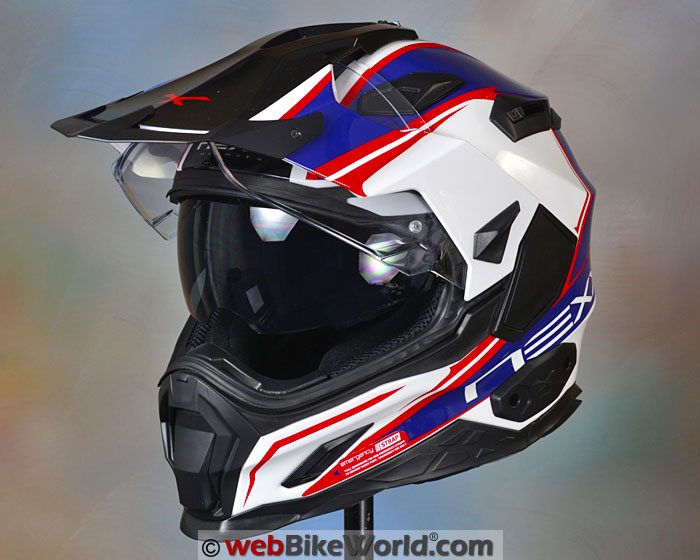
Introduction
A little background on the XD1 is in order, then we’ll get to the details, which differ insignificantly from our Touratech Aventuro review so much of that will be repeated here. The main difference is that the Aventuro has a carbon fiber shell but it does not have the internal sun visor of the XD1. The XD1 has a composite shell, listed as “multi-axial fiberglass, 3D organic fibers, special aramid fibers and carbon reinforcement”.
The helmets are otherwise nearly identical, differentiated by color schemes and the internal sun visor on the XD1, which may be the “must have” feature for some. Even with the carbon fiber shell, the Aventuro in size large weighs just 11 grams less than the XD1 with the internal sun visor. So it can be assumed that the internal sun visor accounts for most of that weight.
The high-tech composite shell of the XD1 doesn’t seem to add much weight and, in fact, this type of construction is preferred by some motorcyclists. The XD1 comes in black, matte black, white, gray and high-visibility yellow solid colors, along with the “Voyager” graphics in 5 different shades. The red, white and blue graphics on the size large XD1 shown here is a webBikeWorld special one-off color combo that unfortunately hasn’t (yet) made it to production and we also have a size medium XD1 in white with black trim.
Curiously, our size M weighs 1597 grams, which is 15 grams heavier than the size L. Never had that happen before…
By the way, the XD1 is loaded with features — so many that it’s hard to describe everything and we’ll probably miss one or two but we’ll give it our best shot!
Paint, Graphics and Overall Quality
We first started reviewing Nexx helmets back in 2009 with the Nexx XR1R review. Nexx helmets were unique and have always brought a fresh approach to the industry, but a few of the original features — like the face shield rotating system — were sub-par back then.
That has all changed and the recent versions of Nexx helmets we’ve used over the last couple of years exhibit both excellent quality and engineering.
The overall build quality on both of our XD1 helmets is outstanding, with no flaws that we can see and that includes the paint, graphics and moving parts. It’s obvious as soon as you pull the XD1 out of the box that you won’t have to make any compromises when it comes to quality.
This is true also of the Aventuro, as mentioned in the webBikeWorld review. All of the moving parts on both helmets have a solid feel.
Nexx includes various accessories to allow an easy swap between dual-sport, full-face and off-road and the XD1 also includes the very unique and very useful action camera mount that easily installs under the peak, held by the screw on top.
It makes a good mounting platform for just about any type of action camera, especially the “tube” type like the ReplayXD Prime X we reviewed recently.
Note that with some action cameras, depending on the lens field of view, a bit of the peak may show in the video, but that can help the viewer orient to the video being played.
For some reason — maybe it was the graphics — we said that “our feeling is that the Aventuro will probably be kept in its dual-sport configuration most of the time.”
Not so with the XD1; it looks very nice as a “Streetfighter” type helmet with the peak removed and especially with the mesh chin vent installed in place of the solid vent rocker.
If you like that look, it is definitely enhanced with the matte black or dark gray versions of the XD1 and in fact, you may never bother to replace the peak once you see it.
The liner and padding is also improved by several clicks from the original Nexx helmets. The fabric is of excellent quality and the stitching around the bottom of the helmet is exceptional and really adds to the “luxe” appeal.
The overall fit and finish of the liner and fabric, along with the gasket along the bottom of the helmet shell, are all first rate.
Score: We’ll rate the XD1 as “Outstanding” for overall quality. See the Summary Table at the bottom of the page for a description of our rating system.
Nexx XD1 Helmet Fit, Internal Shape and Liner
The XD1 is identical to the Aventuro when it comes to fit and internal shape.
The helmet size range runs from XS to XXL. There are two shell sizes for this range (XS-M and L-XXL). The RWB helmet shown here is a size large, recommended to fit a 59-60 cm head and we agree.
The white helmet is a size M, but the reviewers here take either an L or XL, so we’ll have to assume the M fits to size also.
Again like the Aventuro, the XD1 internal shape feels “Neutral” to “Slightly Narrow”, according to the webBikeWorld motorcycle helmet shapes naming conventions. This means that the helmet should fit a variety of head shapes with no problem.
The internal shape feels similar to the Arai RX-Q (review) but maybe shaded a touch more toward “Round” or “Neutral” than that helmet. The XD1 fits like an RX-Q that’s a bit snug at the lower jaw.
The helmet shell has a slight taper towards the bottom, which provides a secure fit but makes the cheek pads feel slightly tight for a wider jaw. We’re not sure if cheek pads with different widths are available as an option.
The padding is thick and the liner is very comfortable; it feels something like a cross between, say, an HJC and a typical Arai or Shoei liner — all good things.
The ear pockets are sized for speakers and the EPS has a molded speaker recess. There’s a nice speaker pocket made from thicker fabric underneath and thinner fabric on top with holes, so this has been specifically designed for speaker placement, another simple but nice feature.
The XD1 also has the Nexx X-Com intercom module recess on the lower left (shown in the video below). The Nexx X-Com intercom is made by Sena for Nexx and it’s bases on the Sena SMH10R (review). (We don’t have an X-Com system so can’t comment on that.)
The liner and cheek pads are removable and Nexx includes the “Ergo” stick-on pad system for a bespoke fit (see video) that can be used to customize the internal shape of the helmet.
Like the Aventuro, eyeglasses or sunglasses with straight temples fit with no obstructions.
The cheek pad/liner split doesn’t interfere with the eyeglass temples as it can with some other helmets we’ve reviewed, because the split line is higher than the temple.
For “Neutral” to “Narrow” head shapes, eyeglass fit shouldn’t be much of a problem with either the Aventuro or XD1, although the recent Arai helmets seem to be the current champs when it comes to eyeglass placement.

More information on helmet fit can be found in the webBikeWorld Motorcycle Helmet FAQ page, along with the chart that lists the helmet weights of webBikeWorld reviewed helmets and also by shape on the webBikeWorld Motorcycle Helmet Shapes page.
Score: We rate the XD1 as “Outstanding” for shape, comfort and padding and the nicely designed speaker pockets.
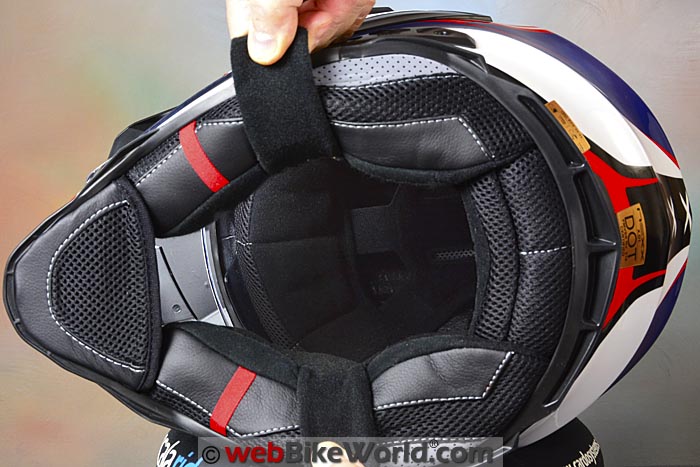
Face Shield, Eye Port and Outward Visibility
The eye port of the XD1 is wide and tall, typical of a dual-sport helmet, although the outward visibility appears to be (very) slightly less expansive than the recent Shoei Hornet X2 (review).
The XD1 peak seems a bit longer than average, so it provides a good sun shade. The tip of the peak is adjustable outwards and the helmet comes with a spare peak tip, just in case.
On the road, the large eye port of the XD1 provides outstanding visibility in the horizontal plane. The “drops” or cutouts on either side of the central dual-sport “beak” are especially noteworthy, as they provide better visibility to the sides when doing over-the-shoulder head checks for traffic or looking for cross traffic when you’re at a stop sign.
Visibility in the vertical is excellent, about the equal of the best full-face helmets in this regard.
The optical quality of the face shield is also excellent and combined with the center face shield lock, the system is among the best of any Dual Sport helmet we have reviewed.
Also, this is again a better system than the Arai XD4 (review), a helmet which now seems slightly dated (even though it was recently released!).
The locking tab at the center is a rare or non-existent on most dual-sport helmets (off-road helmets with face shield). It’s handy and it works as a lift tab and the face shield can be opened slightly for defogging when it’s lowered to the lock but not snapped shut — another plus.
The XD1 also has additional lift tabs on either side of the central locking lift tab. This provides a more solid feel than the Arai, which doesn’t lock and has somewhat of a loose feel when the face shield comes to the end of its travel as it is closed.
The XD1 face shield has excellent optical qualities and it moves through a couple of soft detents. It does not have a recess or molding for the Pinlock insert, which is a plus (a Pinlock insert is included in the European version only).
So if you’re not using the Pinlock insert, there’s nothing to block the view, although the Pinlock has a visible edge all the way around. The face shield on both the Aventuro and XD1 measures 2.25 mm thick.
A gasket fully surrounds the eye port and this, combined with the face shield lock, prevents any water from entering the helmet. This is another plus and one of the weak points of other dual-sport helmets. We tried a couple of pair of standard size off-road goggles, which fit the eye port.

Internal Sun Visor
One of the major differences between the Aventuro and the Nexx XD1 is that the latter comes with the internal sun visor, which doesn’t add much at all to the overall weight (surprise!).
The sun visor is also one of the better implementations of this feature. It has a solid-feeling slider at the upper left, around 10 o’clock high.
The slider has a small detent when the sun visor reaches the uppermost and lowest position, which “locks” the slider in place. This effectively keeps the sun visor from sliding up or down and it’s a thoughtful additional feature.
There’s always the issue of the cavity that holds the sun visor intruding on internal EPS protective space, but the XD1 meets both DOT (in the U.S.A.) and ECE safety standards (in Europe).
The sun visor provides excellent coverage and it lowers far enough to remain out of the rider’s line of sight. Overall, this is an excellent implementation of an internal sun visor, so if you like that feature, the XD1 will win out over the Aventuro.
Score: The visibility and face shield operation and the internal sun visor of the XD1 rate an “Outstanding”.
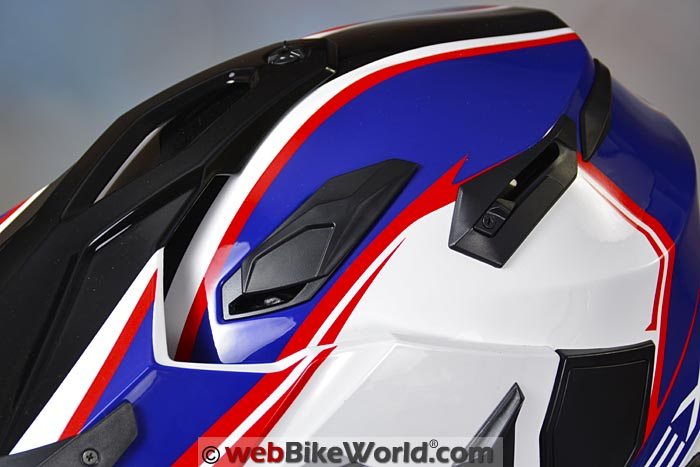
Nexx XD1 Vents and Ventilation
The chin vent of the XD1 has the same interesting design as the Aventuro (naturally, since both of these Nexx-built helmets are nearly identical), with a rocker that forms a recess on top when pushed and allows air to flow through a removable foam filter.
The bottom part of the rocker has a small horizontal hole that should add to the ventilation.
The rocker can be removed to clean the filter and the solid rocker can be replaced with a grid pattern rocker on the XD1 for even more ventilation. The grid can be used with the helmet in either the Dual Sport or Streetfighter mode.
Side vents on either side of the chin bar appear to be more for show than go. There’s an opening towards the rear but it doesn’t appear to have any way to let air flow into the helmet. The air possibly flows over the top of the EPS in the chin bar.
Two top vents have flush-mounted slider covers. Open the sliders to allow air through a large intake passage through the EPS and down through the channels molded into the EPS on the inside for good ventilation.
There are also three large holes on either side of center in the EPS inside the helmet, along with channels in the rear that flow the air out the dual exhaust ports in back of the helmet.
On the road, the XD1 has excellent ventilation in the lower half, with good control over the amount of air flow via the rocker-type chin vent. The foam filtration system doesn’t seem to affect the amount of air coming through.
The top vents bring in fresh air but — like we noted on the Aventuro — the air flow is subtle, the helmet doesn’t get hot (at least in the cooler Spring temperatures we’ve been experiencing) and there’s a sense that air is flowing through the top of the helmet and out the exhaust ports in the rear. We’ll give it an “Above Average” rating.
Bottom line after using both helmets for a couple of months, now into warm weather, is that the ventilation is among the most efficient of the dual-sport helmets we’ve reviewed.

Score: Overall excellent ventilation. Outstanding in the lower half and excellent on top.
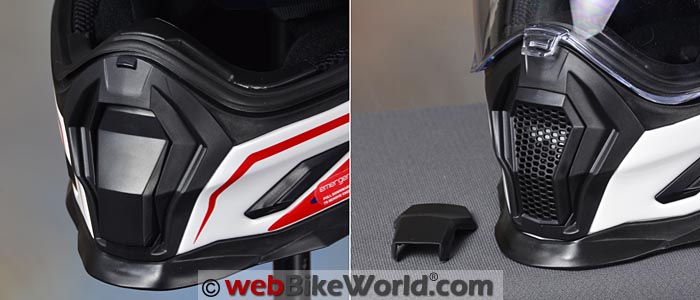
Nexx XD1 Sound Levels
The XD1 and Aventuro both have average to slightly better than average for noise control compared to other dual-sport helmets we’ve reviewed, although the Shoei Hornet X2 we reviewed recently is probably the new champ when it comes to noise control. A perceived noise level is a highly variable thing of course; it depends on the type of motorcycle, windscreen and other factors.
One of the most important factors for noise control is helmet fit. If the internal shape of the helmet doesn’t match the rider’s head and/or leaves gaps along the bottom, noise levels can vary quite a bit and this goes for any helmet.
But overall, the XD1’s build quality and plush interior does a good job to dampen noise. There are no unusual noises generated by the flush-fitting top vents either.
Behind the relatively small windscreen of the 2014 Suzuki V-Strom 1000 (Blog), both helmets have some of the typical Dual Sport helmet buffeting and the “droning” noise that is common with this type of helmet.
This is caused by vibrations on and around the peak and is more the fault of the windscreen than the helmet. It happens with non-Dual Sport street helmets on that bike also…
The noise amount and volume will depend on the height of the rider and where the most turbulent air coming off the top of the windscreen hits the helmet.
Like the Aventuro, the XD1 is about as good as it gets for this type of helmet when compared to others we have reviewed, including the Arai XD4 (review), the AGV AX-8 Dual EVO (review) and others.

Note that our helmet evaluations are a combined effort of several riders over time on different types of motorcycles with and without windscreens. Evaluators wear correctly fitted, high quality ear plugs (even when evaluating motorcycle intercom systems).
Always protect your hearing when riding a motorcycle. See the wBW Earplug Reviews for more information on choosing and wearing earplugs.
Note also that perceived noise levels will vary, depending on the individual.
Noise can be caused by many factors, including helmet fit, the type of motorcycle and windscreen, wind speed and direction and even the rider’s clothing.
For more information on helmet noise, visit the wBW Motorcycle Helmet Noise page.
Score: The XD1 is about average along the top half of the helmet and quieter towards the bottom, so we’ll give it an “Excellent” rating overall.
wBW Video: Nexx XD1 Helmet
Nexx XD1 Helmet Weight
The Touratech Aventuro carbon fiber helmet in size large weighed 1571 grams (3 lbs., 7-3/8 oz.), making it one of the lightest dual-sport helmets we’ve reviewed, bested only by the AGV AX-8 Dual EVO (review) at 1514 grams.
But the XD1 is right behind, weighing just 1582 grams in size large and — strangely enough — 1597 grams for the medium. This is very light for a Dual Sport helmet and apparently the internal sun visor doesn’t add much weight at all.
The XD1 also feels light when riding and it’s nicely balanced, even compared to most full-face helmets.
The X-Lite X-551 (review) in size large weighs 1594 grams, while the Arai XD4 (review) is a hefty 1642 grams in comparison.
The Fly Trekker (review) in size large weighs in at 1795 grams; the AFX FX-41DS (review), also in size large, weighs 1845 grams and the Shoei Hornet X2 (review) in size XL weighs a whopping 1874 grams.
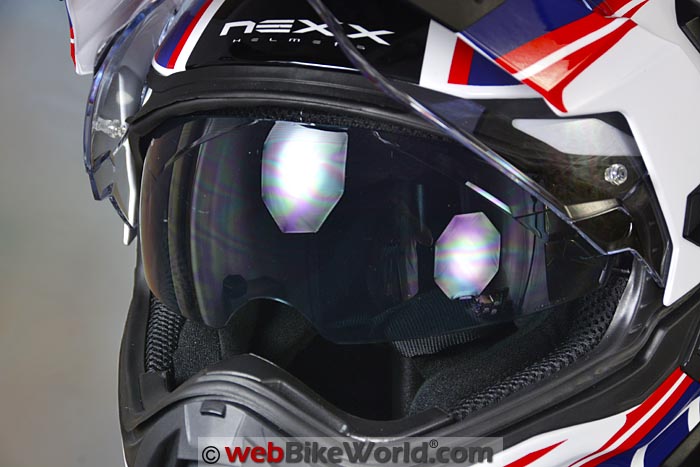
Helmet Lift and Buffeting
The peak on the XD1 is said to be specially designed to provide good aerodynamics and minimize lift. This is true at lower speeds, below about 80 km/h, where the lift is noticeably absent.
Over about 80-90 km/h or so, the lift is noticeable and this probably wouldn’t be the helmet you’d want to take on a high(er) speed cross-country interstate ride. But you knew that, right? It’s true with any of the Dual Sport helmets we have tried.
Again, as is also the case with a Dual Sport or off-road helmet, there is more buffeting with the than you might find with most full-face helmets, when riding behind or without a windscreen; it’s just the nature of the design.
The XD1 design is among the better-performing helmets in this regard, but helmet lift and buffeting is something you’ll have to get used to if you have never tried a dual-sport helmet before.
Fortunately, in slower-speed off-road riding, you won’t notice it. But then again, if you’re doing a lot of that, you’re probably on a true off-road bike and wearing a true off-road helmet anyway…
Score: The XD1 is better than average for lift and buffeting, especially at lower speeds, but it’s still there.
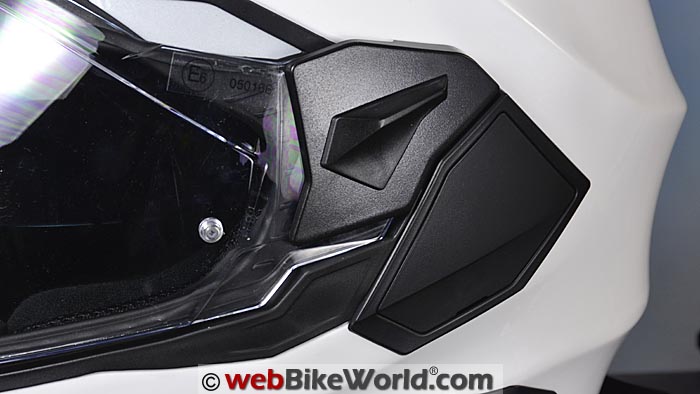
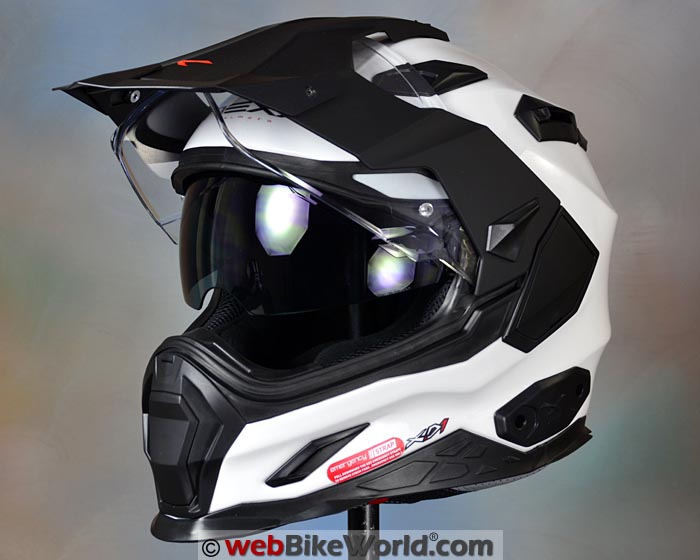
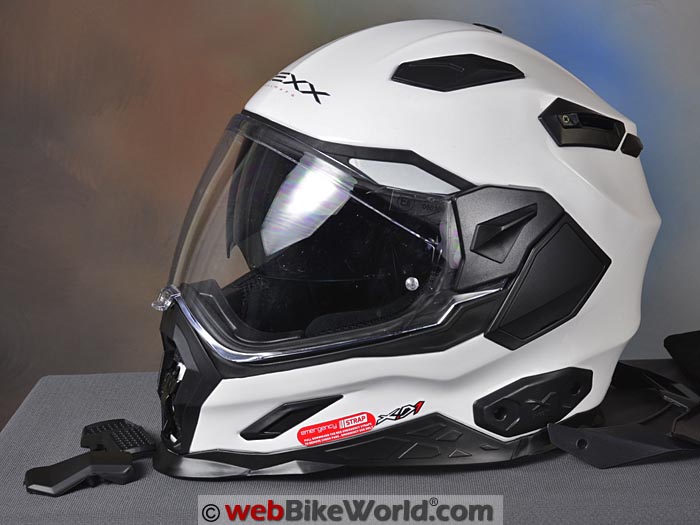
Miscellaneous
The XD1 has a double D-ring chin strap attachment system with a snap to secure the loose end. The chin strap padding is comfortable. Nexx has recently revised their U.S. distribution system and headquarters and Nexx helmets are once again available in the U.S.A.
- Outstanding overall quality.
- Modular design.
- Comfortable liner.
- Very light weight.
- Outstanding visibility out the eye port.
- Designed to fit action camera mounts.
- Buffeting on the peak at higher speeds.
Conclusion
The Nexx XD1 is very nicely made with excellent quality. It’s tough making a choice between the Touratech Aventuro version or the Nexx XD1 and we’re sure Nexx won’t mind which one you choose. On second thought, maybe the choice is easy: if you want an internal sun visor, you want the XD1. About the only other differences are color choices.
After using both the Aventuro and XD1 over the last few months, we’re still convinced that this is one of the nicest dual-sport helmets you’ll find at any price.
And speaking of price — the XD1 has a list price about $150.00 less than either the Arai XD4 or Shoei Hornet X2, with features that neither of those have either. The XD1 is also $200.00 cheaper than the Touratech Aventuro!
This feature set is impressive and useful and it is rider-focused. The thoughtful addition of flat surfaces to mount an action camera (with double-sided stickies) is a great idea.
The XD1 somehow looks better with the peak removed also, especially in the darker colors. This gives it even more utility.
Both helmets perform as good as they look and when you combine the performance with the light weight and outstanding build quality, it’s hard to beat the XD1.
Owner Comments and Feedback
See details on submitting comments.
From “R.B.” (June 2015): “I was excited to purchase one of these helmets, as I had heard good things about its features, well-described in your review.
After a bit more than 1000 miles use, there are, however, a few factors to be aware of.
First, the inner pads can become detached just when removing the helmet. The pads are held in place by three snaps, but the snaps themselves can separate, leaving one part of the snap attached to the inner part of the shell and the other part attached to the pad.
It’s not a big deal to put things back in place, but along the road this can be frustrating. Easily removable pads is a much appreciated safety feature, but there is a downside in every-day use.
Second, the chin strap is already fraying where it runs through the double-D ring, which makes me wonder about the all-around durability of the helmet.
Third, the chin curtain is a great idea, but mine blew away somewhere along I-95 a few days after I received it, and the vendor from whom I purchased it does not know when a replacement might be available.
I give the helmet an A-plus for features, but a C-minus for usability.”
From “S.C.” (June 2015): “Loved your review of the XD1 helmet. I bought one of the very first of this model to be shipped to the US and have put several hundred miles on it since. Your experience matches mine in all respects.
It should be noted however, that the US version of this helmet does NOT include the Pinlock insert. It appears that the European version does include it but the US one doe not. That is a bit frustrating, but that is the way it is.
One another note, the more I use this helmet, the more I like it. It just keeps feeling better on my head the more I use it. I would definitely recommend it.”


